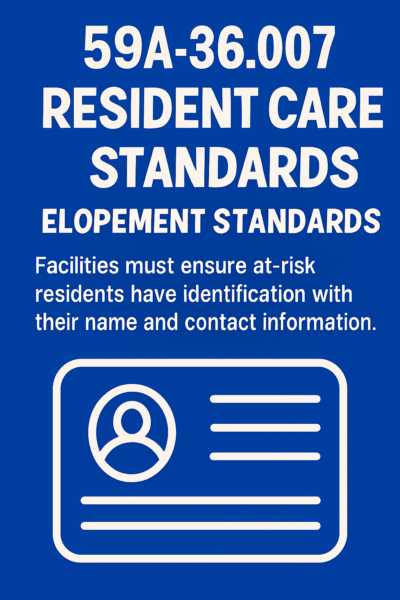
Elopement Standards in ALFs: Daily ID Checks Required by 59A-36.007
Resident safety is at the heart of Assisted Living Facility (ALF) operations. Among the many risks facilities must prepare for, resident elopement is one of the most serious. Florida’s regulations require facilities to take proactive steps to protect at-risk residents who may wander or leave the premises unsafely.
Florida Administrative Code 59A-36.007 Resident Care Standards (7) Elopement Standards states:
“As part of its resident elopement response policies and procedures, the facility must make, at a minimum, a daily effort to determine that at risk residents have identification on their persons that includes their name and the facility’s name, address, and telephone number.”
Why This Matters
Elopement is a life-threatening situation. Residents with dementia, memory loss, or cognitive decline may become disoriented and attempt to leave the facility. Without proper safeguards, this can lead to serious harm.
This regulation ensures that if an at-risk resident does elope, they can be quickly identified and returned safely. Identification acts as a lifeline, connecting the resident back to your facility.
What Facilities Must Do ✅
- Identify At-Risk Residents
- Conduct assessments to determine who is at risk of wandering or elopement.
- Document these findings in resident care plans.
- Provide and Check Identification Daily
- Each at-risk resident must carry ID with:
- Resident’s name
- Facility name, address, and telephone number
- Acceptable forms: bracelets, necklaces, or sewn-in tags on clothing.
- Each at-risk resident must carry ID with:
- Make Daily Efforts
- Staff must check daily that residents are wearing or carrying their ID.
- Document the effort in staff notes, shift reports, or a dedicated log.
- Train Staff on Procedures
- Train all staff on how to identify at-risk residents.
- Reinforce the importance of checking IDs during shift change or morning rounds.
Best Practices for Compliance
- Use Durable ID Options: Medical alert jewelry or waterproof ID bands are practical solutions.
- Incorporate into Daily Routines: Make ID checks part of personal care or morning medication pass.
- Audit Regularly: Supervisors should spot-check compliance during rounds.
- Document, Document, Document: If it isn’t written down, surveyors may consider it not done.
Bottom Line
Elopement prevention isn’t just about locked doors—it’s about preparedness and identification. By ensuring that all at-risk residents carry ID every day, ALFs comply with 59A-36.007(7) and, more importantly, protect their residents.
👉 Tip for Administrators: Create a simple daily checklist for staff to confirm IDs, and store it in your compliance binder. This provides proof during inspections and ensures resident safety remains the top priority.